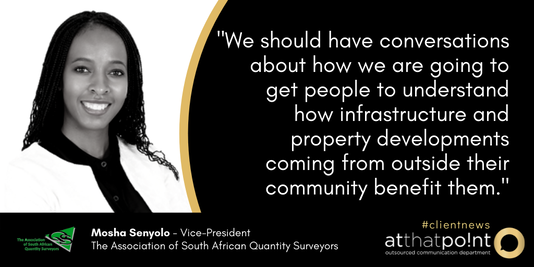|
“In the wake of the July incidences of looting and destruction, we need to rethink the role property development can play in addressing a variety of socio-economic issues in South Africa,” says Mosha Senyolo, newly elected Vice-President of the Association of South African Quantity Surveyors (ASAQS). “Before we can talk about feasible solutions, we must first understand the unique South African problem that we actually need to solve.”
“Saying that no one would want to invest in South Africa due to socio-economic instability isn’t likely to inspire those in need of help to make different choices,” says Senyolo. “We should rather have conversations about how we are going to get people to understand how infrastructure and property developments coming from outside their community benefit them.” “In addition to this, social responsibility should be at the forefront when rethinking how the sector approaches property development, for example,” says Larry Feinberg, Executive Director of the ASAQS. “To sustainably address the unique South African challenges, the property sector will be required to take on social responsibility that goes beyond just – for example – skills development.” This proposed focus on increased social responsibility aligns to the ESG trend where investors consider not only the financial return, but also the environmental, social and governance aspects of projects and companies they invest in. “There are opportunities to assist people to start businesses and allow them to thrive without the usual capital constraints that goes with running a business that requires a physical location.” “For example, an office space developer could allocate a small rent-free portion to a business that just needs a physical location at a great address to give them an edge,” explains Feinberg. Similarly, a retail developer could allocate a small rent-free portion to spaza-type shops, allowing the shop owners to benefit from the foot traffic of the established brands located in the mall.” “Collaboration between the public and private sector will be key to bringing these important changes about,” says Senyolo. Keith Skinner, newly elected ASAQS President, agrees with Senyolo. “Going forward, social responsibility and local community inclusivity are key to new property developments providing good returns in respect of benefits to the community, planet and being profitable investments.” “We can’t wait for some undefined point in the future; we need to rethink our approach to the inclusion of local communities in the new property developments process now!” According to Skinner, Quantity Surveyors can support the inclusion of local community involvement in the construction phases of a project without it necessarily being a financial burden to the project. The education, training and knowledge base required of Professional Quantity Surveyors (PrQS) equips them to implement clearly defined – and well documented – procurement processes. “Quantity Surveyors are well placed to effect and manage financial governance and reporting processes on projects,” explains Skinner. “Thorough financial control minimises opportunities for fruitless expenditure and corrupt activities, thus ensuring that funds are utilised efficiently, and to the maximum benefit of both investors and communities.” ENDS MEDIA CONTACT: Stephné du Toit, [email protected], 084 587 9933, www.atthatpoint.co.za For more information on ASAQS please visit: Website: www.asaqs.co.za Facebook: facebook.com/asaqsza Linkedin: linkedin.com/company/asaqs
0 Comments
Leave a Reply. |
Archives
July 2024
Categories
All
|


 RSS Feed
RSS Feed